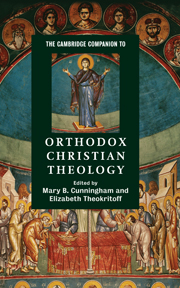Book contents
- Frontmatter
- Who are the Orthodox Christians? A historical introduction
- Part I Doctrine and Tradition
- 1 Scripture and tradition in the Church
- 2 Biblical interpretation in worship
- 3 God in Trinity
- 4 Creator and creation
- 5 The human person as image and likeness of God
- 6 Christ and salvation
- 7 Eschatology
- 8 The Church
- 9 Theology of the icon
- 10 The spiritual way
- Part II Contemporary Orthodox Theology: its Formation and Character
- Glossary
- Bibliography
- Index
- Series list
3 - God in Trinity
from Part I - Doctrine and Tradition
Published online by Cambridge University Press: 28 March 2009
- Frontmatter
- Who are the Orthodox Christians? A historical introduction
- Part I Doctrine and Tradition
- 1 Scripture and tradition in the Church
- 2 Biblical interpretation in worship
- 3 God in Trinity
- 4 Creator and creation
- 5 The human person as image and likeness of God
- 6 Christ and salvation
- 7 Eschatology
- 8 The Church
- 9 Theology of the icon
- 10 The spiritual way
- Part II Contemporary Orthodox Theology: its Formation and Character
- Glossary
- Bibliography
- Index
- Series list
Summary
THE DIVINE TRINITY
The mystery of the living God is that of the Tri-Unity. This, which unites the Three and the One in a single aspect and in a unique formulation but which also recalls the mystery of the Three and of the One, is beyond all conceptions of multiplicity and plurality. It is appropriate to cite here the celebrated passage by St Gregory of Nazianzus (known as 'the Theologian') in order to introduce Orthodox trinitarian theology:
No sooner do I conceive of the One than I am illumined by the splendour of the Three; no sooner do I distinguish them than I am carried back to the One. When I think of any One of the Three I think of him as the whole, and my eyes are filled, and the greater part of what I am thinking escapes me. I cannot grasp the greatness of that One so as to attribute a greater greatness to the rest. When I contemplate the Three together, I see but one torch, and cannot divide or measure out the undivided Light.
The whole trinitarian economy, that is, the joint and particular action of the divine Hypostases in this world, cannot be separated from the revelation and adoration of the Holy Trinity. This trinitarian revelation, which the prophets foretold, is realised by and in Christ in whom the fullness of the divine nature resides and in whom the Father and the Holy Spirit also remain in fullness. It was finally transmitted by and in the Spirit at Pentecost, inspiring and giving perpetual vigour to the sacramental and liturgical life of the Church.
- Type
- Chapter
- Information
- The Cambridge Companion to Orthodox Christian Theology , pp. 49 - 62Publisher: Cambridge University PressPrint publication year: 2008
- 1
- Cited by



